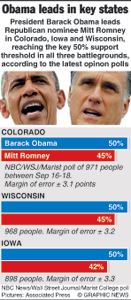Sunday Times 2
Mitt and the moochers
WASHINGTON, DC – The Republican Party has some potentially winning themes for America’s presidential and congressional elections in November. Americans have long been sceptical of government, with a tradition of resistance to perceived government overreach that extends back to their country’s founding years. This tradition has bequeathed to today’s Americans a related rejection of public subsidies and a cultural aversion to “dependence” on state support.

But Republican presidential candidate Mitt Romney and other leading members of his party have played these cards completely wrong in this election cycle. Romney is apparently taken with the idea that many Americans, the so-called 47%, do not pay federal income tax. He believes that they view themselves as “victims” and have become “dependent” on the government.
But this misses two obvious points. First, most of the 47% pay a great deal of tax on their earnings, property, and goods purchased. They also work hard to make a living in a country where median household income has declined to a level last seen in the mid-1990s.
Second, the really big subsidies in modern America flow to a part of its financial elite – the privileged few who are in charge of the biggest firms on Wall Street.
Seen in broad historical perspective, this is not such an unusual situation. In their recent bestselling economic history, Why Nations Fail, Daron Acemoglu and James Robinson cite many past and current cases in which powerful individuals attain control over the state and use this power to enrich themselves.
In many pre-industrial societies, for example, control over the state was the best way to assure wealth. And, in many developing countries endowed with valuable natural resources, fighting to gain control of the government has proved a very attractive strategy. (I have worked with Acemoglu and Robinson on related issues, though I was not involved in writing the book.)
The traditional mechanism of state capture in much of the world is violence. But that is not true in the United States. Nor is it the case that US government officials are typically bribed in an open fashion (though there have been some prominent exceptions).
Instead, special interests compete for influence through campaign contributions and other forms of political donations. They also run large, sophisticated media campaigns aimed at persuading policymakers and the public that what is good for their special interest is good for the country.
No one has succeeded in the modern American political game like the biggest banks on Wall Street, which lobbied for deregulation during the three decades prior to the crisis of 2008, and then pushed back effectively against almost all dimensions of financial reform.
Their success has paid off handsomely. The top executives at 14 leading financial firms received cash compensation (as salary, bonus, and/or stock options exercised) totaling roughly $2.5 billion in 2000-2008 – with five individuals alone receiving $2 billion.
But these masters of the universe did not earn that money without massive government assistance. By being perceived as “too big to fail,” their banks benefit from a government backstop or downside guarantee. They can take on more risk – running a more highly leveraged business with less shareholder capital. They get bigger returns when things go well and receive state support when fortune turns against them: heads they win, tails we lose.
And the losses are colossal. According to a recent report on the aftermath of the 2008 crisis, prepared by Better Markets, an advocacy group that pushes for stronger financial reforms, the cost to the US economy of the financial crisis – caused by financial institutions’ reckless risk-taking – amounts to at least $12.8 trillion. A big part of this cost has come in the form of jobs lost and lives derailed for the bottom 47% of the American income distribution.
Former Utah Governor and Republican presidential candidate Jon Huntsman addressed this issue clearly and repeatedly as he sought – unsuccessfully – to win his party’s nomination to challenge President Barack Obama. Force the banks to break up, he argued, in order to cut off their subsidies. Make these financial institutions small enough and simple enough to fail – then let the market decide which of them should sink or swim.
That is an argument around which all conservatives should be able to rally. After all, the emergence of global megabanks was not a market outcome; these banks are government-sponsored and subsidised enterprises, propped up by taxpayers. (This is as true in Europe today as it is in the US.)
Romney is right to raise the issue of subsidies, but he badly misstates what has happened in the US during the last four years. The big, nontransparent, and dangerous subsidies are off-budget, contingent liabilities generated by government support for too-big-to-fail financial institutions. These subsidies do not appear in any annual appropriation, and they are not well measured by the government – which is part of what makes them so appealing to the big banks and so damaging to everyone else.
If only Romney had turned popular disdain for subsidies against the global megabanks, he would now be coasting into the White House. Instead, by going after the hard-pressed 47% of America – the very people who have been hurt the most by reckless bank behavior – his prospect of victory in November has been severely damaged.
Simon Johnson, a former chief economist of the IMF, is co-founder of a leading economics blog, The Baseline Scenario, a professor at MIT Sloan, a senior fellow at the Peterson Institute for International Economics, and co-author, with James Kwak, of White House Burning: The Founding Fathers, Our National Debt, and Why It Matters to You.
Copyright: Project Syndicate, 2012. Exclsuive to the Sunday Times
Follow @timesonlinelk
comments powered by Disqus
























